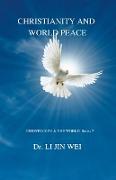CHRISTIANITY AND WORLD PEACE
BücherAngebote / Angebote:
Christianity has contributed significantly to world peace. Through organizations, interfaith dialogue, community statements, etc., Christianity operates in a supportive world and allows others to participate, thus creating world peace. Followers of Christianity used the New Testament for guidance on spending their lives in harmony. As an example of peace, Jesus Christ is represented in the New Testament as a man who promoted nonviolence and served as an example of peace. A person must first be spiritually calm to express his feelings of inner peace. The Christian principles of nonviolence, justice, reconciliation, and compassion can be found in the New Testament. They can do that with the teachings of Jesus Christ, which are found in the New Testament and the Old Testament. There is a lot of false criticism of this religion, exposing it as a source of violence and a religion that speaks of peace. The Bible's teachings of non-violence, compassion, and tolerance strengthen their peace. Christianity has contributed to world peace through organizations such as the 'United Nations, which uses several programs, including peacebuilding in conflict zones, eradicating poverty, and exploiting the health and well-being of children. This organization has been operating at the international level to achieve peace and has contributed to world peace. Christianity can contribute to world peace in a variety of ways. One of these schools is a partnership with live projects. These programs are designed to promote peace and harmony and encourage Christians and non-Christians to live in peace independently. One such project is the European Union in Europe, run by European states to work for the safety and security of Christina countries and offers a wide range of education. This project does not attempt to provide a straightforward answer to the most difficult questions as to whether religion is the cause of the conflict, and if so, how can religious violence against the opening of the new Millennium be prevented? Instead, it shows the translation lenses and the language we use to deal with these questions. It is also a modest effort to provide clever tools to deal with the multi-faceted concept of 'religion' in conflict situations and build global peace. This book explores and analyzes the relationship between faith and conflict without producing a comprehensive review of existing literature that focuses on these principles or on understanding the violence between the world's
Folgt in ca. 10 Arbeitstagen




